Peter MALONE
Saturday, 18 September 2021 19:45
Big Fix, The
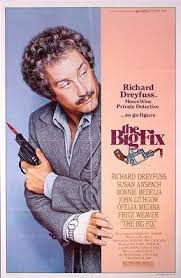
THE BIG FIX
US, 1978, 108 minutes, Colour.
Richard Dreyfuss, Susan Anspach, Bonnie Bedelia, John Lithgow.
Directed by Jeremy Paul Kagan.
The Big Fix may be too American in tone for non-U.S. taste but it will be of interest to those who wonder whatever happened to the 60's protest generation. Highlighting the settling of the 70s and the rush to empty complacency as well as politicking, the film looks nostalgically to the days of causes and protests. Using the private eye genre (comically - Richard Dreyfuss is the detective), the film gives us quite a good mystery (though needing constant attention to follow) as well as much observation about the non-involved, or self-involved, contemporary U.S. scene. Audience ability to move with Dreyfuss through apathy, laughter, tears and disgust is the gauge of the film's success.
1. The meaning of the title? Overtones? The United States, politics, murder? Richard Dreyfuss' appeal in the 70s? How well did they blend for interesting entertainment?
2. The film as a portrait of America in the late 70s? A resume of the political activity of the decade, corruption and exposure? Cover-ups? Political inactivity of those so active in the 60s? The move towards the Establishment? A dissatisfaction with the complacency of the 70s and a comparison with the 60s?
3. How convincing was the comparison with the 60s? In the character of Moses Wein himself, the background of his age and activism in the universities? Howard Eppis and the films of his activity, his plans, sabotage? The irony of his working in an advertising agency and being clean-cut? The film's evocation of the memories and enthusiasm of the 60s? The causes, the fighting for any kind of cause and the repercussions on people's enthusiasm? The bonds between the young people at the time? The human relationships, the memory of love? The trials, the demonstrations? A 70s retrospect view of the 60s?
4. The change of occupations for the demonstrators of the 60s: Moses as private eye? Howard Eppis and advertising, the people working for political campaigns? The film's judgement on this?
5. Moses as the focus of the film. for audience interest and identification? Richard Dreyfuss' energetic style, humorous personality, feelings? At thirty, his relationship with his wife and her appearances throughout the film. Separation, the young boys and his being fatherly? His wife and her taking up with psychology and human development movements of the 70s? Moses and his outings with the boys, their sharing in his private eye work, his talking with them? The risk to their lives in kidnap and being shot? Their participation in his solving the mystery? Seeing him at work as a private eye studying the birds? His relationship with the police? His being sought out by his former girlfriend and involved in the political campaign? His stances of indifference and the changes wrought on him throughout the film? His efficiency at his job, self-integrity and success?
6. Following his work as a private eye - the political campaign, tracking down the printers, moving into the world of the gamblers, visiting the demonstrators in jail and finding leads, moving amongst his friends and tracking them down. the father of the campaign assistant and his attitudes, his involvement with the Spanish-speaking group - Vazquez and company? How well did he combine the various threads with which he was involved?
7. The portrait of the Campaign Manager and his smoothness, Moses helping him, his ambiguity? The audience being suspicious of him? The irony of his relationship with his father and his role in the defence of the demonstrators?
8. The portrait of the girlfriend - her arrival at his front door, the humour? Her role in the campaign, getting Moses to help her? His grief at her death and the visual presentation of his finding her dead? The murder and what it meant to him? The reasons and her death being a by-product? The leads to Vazquez, to political assassinations and chases? The girl as a person, her role in the dramatics?
9. The comment on the revolutionaries of the past, Moses tracking down Howard Eppis and seeing the change in him, Eppis' account of himself and his work? The suddenness of the raid and its violence?
10. The assassins and their violence, torture? Moses' ability at luring them and capturing them and finding the truth?
11. The picture of Establishment politics, campaigns, candidates? Moses' friends and their devotion? The irony of the aide and the audience suspicious of him? The sequence of his link with the aide from the opposing party and his explanation of political espionage? The Establishment and their use of politics, names, bombings, conspiracies? The portrait of the well-to-do father and his revenge on his son - symbol of American politics and attitudes of the 70s?
12. The discovery of the truth, its effect on Moses? His observation of people and his children helping? A satisfying ending - and Moses' future?
13. The film as a reflection of America in the 70s - ideas, styles? The manners and talk of Americans? Nostalgia of the past? Insight into the American temperament and character?
Published in Movie Reviews
Published in
Movie Reviews
Tagged under
Saturday, 18 September 2021 19:45
Biggest Bundle of Them All, The
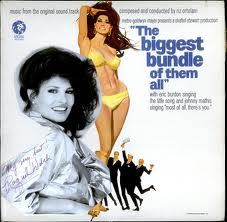
THE BIGGEST BUNDLE OF THEM ALL
US, 1967, 110 minutes Colour.
Raquel Welch, Robert Wagner, Vittorio De Sica, Edward G. Robinson, Godfrey Cambridge.
Directed by Ken Annakin.
The Biggest Bundle Of Them All was one of many caper films of the late 1960s and early 1970s - no worse, a little better. It has smart direction by Ken Annakin, who directed many thrillers in England before moving to America as well as directing a number of Disney's live action adventures. During the '60s he directed a number of spectacular films including Those Magnificent Men In Their Flying Machines and The Battle of the Bulge. He brings the same kind of spectacular sweep to this modest story. There is an international cast with Vittorio De Sica over-acting and hamming in the central role. The story is by producer and co-writer Josef Shaftel.
1. The perennial popularity of this kind of caper film? The gallery of characters, the exotic situation, the plan for a large robbery, hazards and mistakes, success? The amoral caper comedy?
2. The European photography and Panavision? The special effects for illustrating each character, for the plans for the robbery, for the robbery itself? The musical score and its light touch - by Riz Ortolani?
3. Audiences accepting the conventions of this kind of film? The quick establishing of the characters, their characteristics and background. their working together, the small-time gangsters being overtaken by the large scale planners? The details of the plan, mistakes, successes? The plausibility and implausibility?
4. Cesare Celli as the focus of the film? The background of the retired mobsters? Funerals? His being held to ransom - and his being broke, nobody coming to rescue him? His taking over of the motley group? His plans? His calling in the professor for more accurate planning? The mistakes on the way? The success of the robbery. the chase? The new plan? The humorous parody of the Italian mobster?
5. Robert Wagner and Raquel Welch as romantic leads? Harry and his gang? The kidnapping, the role of leader, his handing it over to Cesare? His relationship with the rest of the group, exasperation, ineptness? His relationship with Juliana? The participation in the crime? Future plans? Juliana as attractive heroine - and Raquel Welch's particular style?
6. The gallery of minor characters Benjamin and his money troubles, his music? Davy and his mechanical skills and family with eleven children? The chef and his enjoyment of food? The minor characters associated with the group?
7. Professor Samuels and Edward G. Robinson parodying himself? The master crook. his taste. wealth, smooth talk? His organising of the plans? The failure of the platinum robbery and his plans for the next robbery?
8. The action sequences, the various small robberies with their farcical overtones? The spectacular ending? The robbery, the final flight, the chase and the police?
9. The audience willing to suspend disbelief as regards characters, robberies, moral issues? The enjoyment of this kind of amoral caper film?
Published in Movie Reviews
Published in
Movie Reviews
Tagged under
Saturday, 18 September 2021 19:45
Big Hangover, The
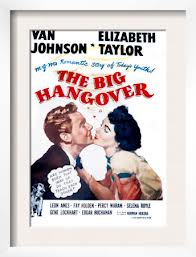
THE BIG HANGOVER
US, 1959, 82 minutes, Black and white.
Robert Taylor, Elizabeth Taylor, Fay Holden, Leon Ames, Edgar Buchanan.
Directed by Norman Krasna.
The Big Hangover is a slight but pleasant MGM comedy of 1950. It was written, produced and directed by playwright Norman Krasna, better known for his screenplays than direction (Ambassador's Daughter, Indiscreet). Van Johnson is amiable in the central role of a World War Two veteran who has had a traumatic experience with brandy and is set off alcoholically by a whiff. The young Elizabeth Taylor is somewhat stiff and serious in this film - it was the period of The Father of the Bride and her emergence as an adult star. There is a sympathetic performance by Leon Ames as a District Attorney.
There are comic touches, romance - and some strong moralising about political, legal and financial corruption as well as racism towards Chinese Americans.
1. Entertaining comedy? Romance? Social message?
2. Black and white photography, the stars? Musical score?
3. The title and its focus? David's story about the war, the brandy, the death of his best friend, the alcoholic experiences? The final telling the truth and his recovery?
4. David as the central focus, his war background, study, law, motivation for studying and the memory of the death of his best friend? His story about the war? His work in the firm after being top of his class? The encounter with the boss and his promotion? Meeting Mary and attracted towards her? The party and the discovery of his dilemma? His uncle at home and the sharing of the bottle of brandy? His aunt and her strictness? The celebrations, Mary trying to help him and the therapy? Her parents and their observation? Meeting the District Attorney, the situation of the Chinese doctor, his intervening? Packford and the staff meeting and their ploys against the doctor? The banquet, Packford putting alcohol in his meal, his singing behaviour, Mary's reaction? The importance of his speaking out against the DA and the company? His telling the truth, listening to Belcamp and the apology? His resignation? The previous practice of his speech and his friend's letter, his final speech - his future, Mary?
5. Mary as the boss's daughter, Elizabeth Taylor in the role, seriousness, concern about David, trying to help him, the meal, his telling the truth, their future?
6. His uncle and his wiles of getting past his wife, drinking the brandy, his being drunk, the aunt's concern?
7. The boss, the legal firm, manipulation, money deals, ousting the Chinese doctor, Belcamp and his interest in the firm, playing up to the firm? The role of Packford and his prejudice? The banquet, making David drunk? Packford acting like a child?
8. Belcamp and his background, his devotion to his wife and the meal with David and Mary? His ideals? Friendship with the law firm? Trying to support the doctor? His joining the firm at the banquet? David's attack on him? His explanation, his sense of integrity, his admission of wanting to be liked? The role of the public servant, the minimum salary? A persuasive speech about legal firms, corruption and favours?
9. The blend of the comic and the serious? 1950s style? Impact now?
Published in Movie Reviews
Published in
Movie Reviews
Tagged under
Saturday, 18 September 2021 19:45
Big Heat, The
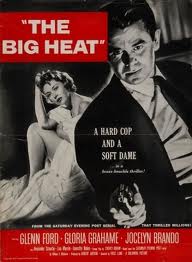
THE BIG HEAT
US, 1953, 90 minutes, Black and White.
Glenn Ford, Gloria Grahame, Jocelyn Brando, Lee Marvin, Alexander Scourby, Carolyn Jones.
Directed by Fritz Lang.
The Big Heat is an effective crime thriller of the early 50s. It was directed by Fritz Lang who had made such silent classics in Germany as Metropolis and Dr. Mabuse. He had also made the film which marked Peter Lorre's debut M. Lang was popular in Germany, especially with Dr. Goebels. However, he moved to America in the 30s and made such classics as Fury, You Only Live Once. He became a Hollywood regular through the 40s and 50s.
Glenn Ford, at the peak of his career in mid-50s to the early 60s is the hero. Gloria Grahame, who had won an Oscar for The Bad and the Beautiful and was able to perform, if oddly, in roles ranging from Oklahoma to Red Skelton comedies, was the heroine. They also appeared in Lang's adaptation of Zola's Human Desire at this particular period. Lee Marvin is a particularly vicious villain. The Big Heat may seem dated by the standards of the gangster thrillers of the 60s and 70s. However, it is quite a good revenge police film.
1. A successful gangster film? The American gangster tradition? The 50s, the change of pace in later decades?
2. The film as a product of the work of Fritz Lang? His German background of the 20s, surrealism, 'M' and the 30s? A German in America treating the gangster tradition?
3. The qualities of filming in the 50s: black and white photography, musical score for gangster films, the life in the city, atmosphere, violence? The contribution of the stars in their hey-day?
4. Where did audience sympathies lie? With the hero, his wife? Antipathy towards the villains? Gangsters? How much sympathy towards Debbie? The presentation of good and evil, right and wrong and audience sympathy and judgement?
5. The portrait of social corruption and its influence on people in official positions, the police, ordinary citizens? Individual corruption and its contribution to society?
6. The vengeance theme? The provocation to Dave Banyon in his work and career, the death of his wife and its effect on his whole life? Did he have the right to vengeance? The way that he took it? Vengeance and the individual and the law? When the law itself is corrupt?
7. The atmosphere of the opening: the suicide, Mrs Duncan and her reading her husband's note, her actions, the repercussions? The sour note and the atmosphere of evil?
8. Dave Banyon as hero within this situation? Glenn Ford's style, the ordinary citizen, the ordinary policeman? The quality of his work? The sequences of his clashes with authority and his suspicions? His ordinary middle class situation confronting gangsters and their wealth? Banyon as a type who confronted people? His being under orders, his decision to move away from this? The power and freedom when acting on his own? His attitude towards law and order, towards justice?
9. The murder mystery aspects of the film: the various suspects, the details of the murders, Banyon's interrogation especially with the girl in the bar and her death? The ugliness of the atmosphere of threats and violence?
10. The contrast with the domestic scenes? The happiness of Banyon, his wife and family? The tone of the home sequences? His wife's support of his work? The dramatics of her death and the sudden off-screen impact? The effect on him, on the audience?
11. The portrayal of Mike Lagana, as a gangster type, his reputation, power? The party sequence? His hold over the police, his hold over his own henchmen? The protection of the law and society? His use of money? His lack of scruple? With Stone, with Debbie, with Mrs Duncan?
12. Lee Marvin's style as Stone? The cruel and unscrupulous gangster? His enjoyment of making others suffer? The visualizing of his torture? The famous coffee-scalding sequence with Debbie? Her revenge on him? His smug self-satisfaction and attitude towards Banyon? To the various henchmen?
13. Banyon's following of the leads - especially the crippled lady? His encounter with the minor toughs, the gunmen from out of town? His persuading them to talk? His moving on the information and his acting as a loner?
14. The characterization of Debbie? The conventional gangster's moll? with Lagane, with Stone? The effect of the coffee-scalding? Her hurt and her reaction, the physical effects? Her decision to help Banyon? Her speculation of how she would have related well to him? The final help and the killing of Mrs Duncan?
15. The portrait of Mrs Duncan as the cold unscrupulous woman? The intricacies of her involvement and the way these were explained and exposed? The clash with Banyon and the temptation for her to be killed? The impact of Debbie's killing her?
16. The physical violence, the shooting and the shoot-outs? The violent deaths of the principal villains?
17. The film as an exploration of American values and American violence, justice and law and order?
Published in Movie Reviews
Published in
Movie Reviews
Tagged under
Saturday, 18 September 2021 19:45
Big Jake
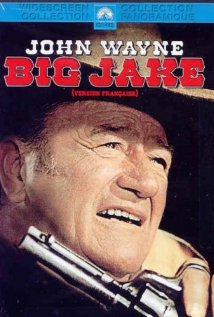
BIG JAKE
US, 1971, 117 minutes, Colour.
John Wayne, Richard Boone, Maureen O'Hara, Patrick Wayne, Christopher Mitchum.
Directed by George Sherman.
Big Jake is a typical latter-day John Wayne western with plenty of action against villain Richard Boone, some fiery interchanges with wife Maureen O’Hara? and some (reactionary!) treatment of his sons in their mid-twenties. The film nods to Easy Rider, Butch Cassidy and Wild Bunch trends, but might-is-right Wayne morality and the horses win out at the end.
Action audiences like it and one can always argue the pros and cons of Wayne's American stances.
1. Was this just another John Wayne western? Was there anything distinctive about it?
2. Did you like the credit sequences with the contrast of the civilised East and the uncivilised West in 1909? What was the message? Did the film follow up this theme?
3. What did the film say about the influence of the West by 1909? Did the credits say that the Western tradition was an ennobling one? Did the rest of the film say that the old Western traditions were dead and discredited? What illustrates your answer?
4. The gang at the opening were shown to be vicious. Were they typical of the villains of the West?
5. Was Jake McCandles? a typical hero of the West? Was he a good man? of what did his heroism consist?
6. What impact did the kidnapping and the massacre at the peaceful ranch have on you? Did you feel that such brutality needed to be avenged? Why?
7. What did the film say about cars and motorcycles taking over from the horse in the West? Did you enjoy Michael's taunting the villains with his bike? However, the cars and bike were rendered useless and the horse and donkey were successful. What side did John Wayne take in the dispute between old ways and new ways? Did he set up the dispute fairly or was the dispute 'rigged' in favour of the horse?
8. why were Martha and Jake estranged? What kind of woman was Martha? What kind of authority did Jake stand for, especially in his attitude towards his sons? Should his sons have submitted to him as they did?
9. Jake believed in a justice and self-defence where you shot an evil man before he could harm you. Is this kind of justice morally based? Was it a taken-for-granted code in the West? Could there have been any other code there?
10. Should there be any code of honour or ethics in a shoot-out or should it be no holds barred? What attitudes towards the taking of life should a man have in a shoot-out? Is this question irrelevant?
11. The action in this film and much of the dialogue was tongue-in cheek. How seriously did the film take itself?
Published in Movie Reviews
Published in
Movie Reviews
Tagged under
Saturday, 18 September 2021 19:45
Big Land, The
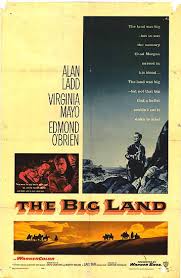
THE BIG LAND
US, 1957, 92 minutes, Colour.
Alan Ladd, Virginia Mayo, Edmond O'Brien, Anthony Caruso, Julie Bishop, John Qualen.
Directed by Gordon Douglas.
The Big Land is a moderately entertaining Alan Ladd western of the late '50s. It is routine material about the taking of cattle from Texas to the Mid-West? states, the opposition of ruthless cattle dealers and violence and vengeance. Alan Ladd is at home in this kind of film - and is emphasised as a southerner, a Reb (as in One Foot In Hell and The Proud Rebel, also made in these years). Virginia Mayo is a competent leading lady - and has an effective song by David Buttolph which becomes the theme of the film. Edmond O'Brien has a good role as an alcoholic. Direction is by Gordon Douglas who made many westerns in the '50s and action adventures in the '60s.
1. Expectations of a western? Popularity? Audiences accepting the conventions? Texas, the Mid-West?, cattle struggles? A competent western?
2. Colour photography, use of locations? Special effects, especially for the stampede? Musical score, Virginia Mayo's song and its lyrics about strong and weak men - and it becoming a plaintive theme for the film?
3. The post-Civil War situation: the Rebs and their anger, Texas and its not providing support for cattle, the cattle movement to Kansas and Missouri, cheated in deals? Loyalties, clashes? The move to the mid-west? The use of the map to emphasise the American heritage in the 19th century?
4. Alan Ladd as Morgan - his stolid cinema presence? Laconic hero? The encounter with Joe Jagger and Edmond O'Brien's skill in an alcoholic role? Clashes, Morgan saving Joe, Joe in the saloon as alcoholic? The journey together and the D.T's, Morgan's saving Joe? The arrival at the Johnsons' and the support given by the family? The plan for the wheat and the cattle. the building of the town? The origins of the Mid-West? towns?
5. The meeting, the putting up of the money, the plans for the town, Joe's supervising? The cattle dealers and the burning of the town? The success of the building, the sequence with the cattle-bidders arriving at the hotel?
6. The moving of cattle, Morgan's dream, his friends and the fight with them, their siding with him, the long trek? The stampede?
7. The ruthless cattle dealers, robbing the Texas cattlemen, the plan against Morgan, the burning of the town, the confrontation with Joe and killing him, the murder of the cattle-bidder, the setting off of the stampede, the fight with the cattlemen? The confrontation with Morgan? Stereotype -but real villains?
8. The sketch of Joe and his rehabilitation, sense of achievement, relationship with Helen and Tom, the building of the town, the management of the hotel? The challenge by the ruthless dealers? Forcing him to drink -but his not drinking? Confronting in a gunfight? Helen, work in the saloon, the song? Engagement to Tom, helping with the building? The death of Joe? Her anxiety about Morgan?
9. Helen and Tom's giving her up?
10. The cattlemen, the town, the bids, the wheat. the railroad? The local families and their future?
11. A piece of Americana, the 19th century heritage? Themes of violence, law and order, justice? The heroes and heroines of the building of the West?
Published in Movie Reviews
Published in
Movie Reviews
Tagged under
Saturday, 18 September 2021 19:45
Big Red One, The
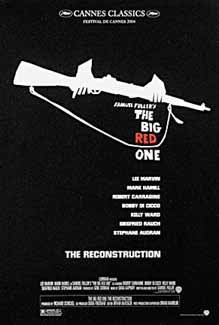
THE BIG RED ONE
US, 1980, 108 minutes, Colour.
Lee Marvin, Mark Hamill, Robert Carradine, Bobby di Cicco, Stephane Audran.
Directed by Samuel Fuller.
Samuel Fuller has made many 'B' action thrillers over 30 years and has become a cult director in Europe. Here he remembers and tells his own war story - the action and heroism of war as well as its violent futility and the ordinary soldiers' absorbing goal of survival. This film entertains on a realistic level. But the film is symbolic of a proud (not jingoistic) U.S. - for the sergeant (Lee Marvin expertly tough and gentle) and his four surviving youngsters are engaged in each major action the Americans were involved in: Africa, Sicily, Italy, Normandy, Belgium, Czechoslovakia. Episodes are telling; the cumulative effect is a picture of a personal war and that of America.
1. The importance of war films? Memories? Heritage? The tradition of war films from the '20s to the '40s? The memoirs of World War Two in the '50s and '60s? This film in that tradition? The '60s and the anti-war film?
2. The traditions of the war film: the presentation of battles and warfare, strategies, battles and death? Situations and people? War and violence? The repercussions of war on society, on individuals?
3. The war film tradition in focusing on the small group as representing involvement in the whole war? The small American group of this film as representing American involvement in World War Two, 1942-45? The effectiveness of this technique? Audiences identifying with characters? Appreciating their representing the broader involvement? The personalising of war?
4. The work of Samuel Fuller? The film as his memoir? The age at which he made the film? His experience of warfare, observing the war, writing, his subsequent literary and film career? His motivation for making the film in the late '70s? His technical expertise - difficulties of making the film, the quantity of film photographed, the difficulties in editing? Fuller's point of view, his creative interpretation of his memories? Strength of plot, characters? The impact of war, its destruction, survival?
5. The contribution of the cast - personalities and presence, especially Lee Marvin? The importance of the African and European locations? The editing and the special effects for war? The use of realism. symbols: seasons, close-ups of animals. e.g. lizards and rabbits etc.? The importance of the atmospheric score?
6. The structure of the film: the episodes and their cumulative effect? American involvement in the various theatres of World War Two? Growth through the involvement? The different kinds of battles, different atmospheres, the effects on the men and their going forward to the next theatre? The film making war experience credible?
7. The American tone of the film, its patriotism? The film being a presentation of war and a criticism of war - patriotic but not jingoistic? The American sergeant and his experience of World War One, his military pride, his representing Uncle Sam? His care for the boys and interest in them? Father figure? The American soldier as both tough and tender, protective and competent? The young soldiers - boys growing into manhood? Detachment, cynicism, innocence, fear? Innocence to experience? The picture of America after Pearl Harbor. and becoming the ally of the Europeans? Africa, Sicily, Italy, England, Normandy, France, Belgium, Germany. Czechoslovakia?
8. The importance of the prologue: the monochrome, the focus on the cross and the figure of Christ, the trench warfare? The death after the armistice-signing? The focus on the crucifix with Christ and death? The sergeant, his attitude towards the war, the encounter with the German? The slogans? The officer shaving and his telling of the war's end? The effect on the sergeant? The transition to World War Two and the importance of The Big Red One? The importance of the return to this setting in the middle of the film? The end of the film with a repetition of the opening? The sergeant confronting the German? His repeating his actions? Making the same mistake? His comment that while he didn't know the war was over, the German did? Trying to save the life of the German and redeeming? The religious overtones of Christ on the cross - especially in the middle of the film with the German hiding behind the cross? The shadow of the cross cast over the dead men? The insects in the eyes of the crucifix? War and its futility? Belief in God, Christianity, European wars?
9. The presentation of the Germans: their French allies on the beaches of Africa and the surrendering to the Americans? The Germans in the desert and the discussion about murder and killing? The sergeant killing the objecting soldier? The advances by Rommel? The fight in the hospital in Tunis? The Germans in France - their ploy in pretending to be dead? Under the shadow of the cross? The presentation of German soldiers at war and their similarity to the young Americans? In Africa, in the cave in Sicily. the Americans taking the gun in the house in Italy, the snipers? The Germans in the asylum? In the concentration camp and the final battle? The Germans as enemy?
10. Lee Marvin's portrayal of the sergeant - his personality, pride in infantry, leading his group? The many young men that served under him, the focus on the four? Their types and characters? The voice-over introduction to them? The explanation of their backgrounds? Their coping with crises, not coping? Changing - as others came and went? Bonds, fraternity? Mutual help?
11. The effect of the voice-over commentary? Inviting the audience to understand the men, the situations?
12. The focus of the title on the infantry, military prowess, loyalty?
13. World War Two in Africa: the Americans landing, the accidental battles on the coast, the French killing their officer and surrendering to the Americans? The harshness of desert warfare? Rommel and his advances? The Americans waiting in the wrong place? The digging of foxholes and the tanks going over the men? Fear and the running in the mountains? The sergeant and his injuries? Hospital in Tunisia? The battles in the hospital? The sergeant escaping as an Arab? The transition to the lyrical reunion on the beach, the boys swimming, writing, drawing cartoons? Their joy in seeing the sergeant?
14. The war in Sicily: the men in the ships waiting to land, the attack on the Wogs' - and the sequence with the gun in the mouth? The terrain of Sicily, the Sicilian villages contrasting with the deserts of Africa? The propaganda posters for Mussolini? The landing, the fighting, the way of life in the Sicilian towns? Liberation? The boy and his dead mother on the cart? The bargaining and his helping them? The dramatics of the taking of the large guns? The working women and their scything the dead Germans? The banquet? The burial of the mother? The helmet covered in flowers? Hiding in the cave, being isolated from the main force which hadn't landed? The Navy saving them? Their killing the Germans coming into the cave? The liberation of Sicily and its effect on them? The human element with the men meeting the Sicilians?
15. The transition to England and recuperation and preparation for D-Day? The boats going to Normandy? The drawing of lots? Omaha Beach and the invading troops pinned down, the massacre, the bombardment, the device of the bloodstained water and the watch showing the time? Their expectations? The importance of the device of getting the pipe through the barbed wire - the young boys going in numbers, so many dead? Griff and his freezing in fear? The sergeant willing to shoot him? The breakthrough? The progress through France and the return to the sergeant's crucifix? The Germans and the hiding? The tank? The change in war in 25 years? The ambush, the sergeant's bluff? The German walking off into the sunset? The transition from fighting to the birth sequence? Ironies of birth and death? Johnson and his achievement? The tenderness of the sergeant for the mother?
16. The advances into Belgium? The attack on the monastery? The irony of the insane and the sane? The points made about war madness? The Strauss waltz, the woman dancing and killing the Germans? The friars and their waiting on the tables? The slaughter of the Germans? The invasion of the monastery and the inmates taking no notice? The madman with the gun saying that he was sane? The refectory - and the presence of Christ in the da Vinci reproduction of the Last Supper?
17. The war in Germany: the fort, the attacks on the trees? The young American who had read the novel and his death, killing his attacker? The reversions of winter? The party and the splurge by the author? The pathos of the party - the drinking, the warmth of the presence of the women? The preparations for further fighting?
18. Czechoslovakia and the concentration camps, the battle, the opening of the ovens, the opening of the huts and the gaunt faces? Griff going berserk and continually firing on the German in the oven? The sergeant giving him more bullets? His purging himself of his fear and anger? The sergeant helping the little boy to eat, carrying him, the pathos of his death?
19. The sergeant wandering and the repetition of attacking the German after the peace was signed? Trying to save the German? The ironic comments about saving German lives after American deaths?
20. Lee Marvin's portrayal of the sergeant as tough and tender, leadership, his strategy, the decoys, for instance, in Sicily, willing to shoot Griff, allowing the party, the flowers on the helmet, his pride in zap's book, his working with Johnson for the birth? Griff and his cartoons?
21. The portrait of the group - American, young, creative, differing backgrounds, hopes? Griff and his cartoons as well as his fear? Zap and his novel - and its being sold to Hollywood? The Samuel Fuller figure?
22. The film as one of Time Magazine's ten best of 1980 - its merits, impact, success?
Published in Movie Reviews
Published in
Movie Reviews
Tagged under
Saturday, 18 September 2021 19:45
Big Sky, The
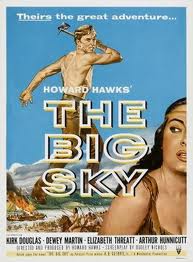
THE BIG SKY
US, 1958, 122 minutes, Black and White.
Kirk Douglas, Dewey Martin, Arthur Hunnicut, Elizabeth Threatt.
Directed by Howard Hawks.
The Big Sky is one of those films which may have been popular enough on release, but was probably dismissed as being rather tame. Now it would be discussed for its style, its themes of the American Adam, and its place in veteran director, Howard Hawks' series of films, especially his Westerns (e.g. Rio Bravo and El Dorado). He stands up well to criticism and, while the pace is leisurely, and there are not too many dastardly or shoot-'em-up sequences, the film communicates the feel of the 1840's and the challenge of exploration and opening up the country. It communicates the human side, the courage and the stupidity of pioneers, It is a likeable film and would be of benefit for American history seminars.
1. The value of recreating a country's history, especially the colourful (not the sensational) exploits of the past?
2. The realities of the exploration of the new world in terms of distances, dangers, nature, hunger, hardships and endurance?
3. The type of men who went on these expeditions, their character, their endurance, their motives. The nature of the pioneering spirit; the boats, hauling, camps, songs, dances?
4. The foundations of modern America on men of Indian, British and French origins? Their clashes, their friendships, the influences of their cultures, their national character traits?
5. The value of trade and commerce in opening up the land? The greed, the treachery, the exploitation of the Indian and his nobility and traditions?
6. The difficulties of communication: French and English temperaments and language; the few who spoke Indian languages; love and lust; the symbolism of the half-witted Indian, 'Poor Devil'?
Published in Movie Reviews
Published in
Movie Reviews
Tagged under
Saturday, 18 September 2021 19:45
Big Sleep, The / 1978
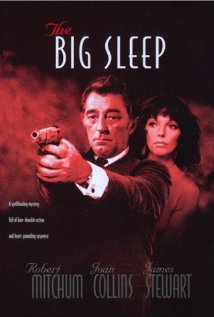
THE BIG SLEEP
UK, 1978, 99 Minutes, Colour.
Robert Mitchum, Candy Clark, Sarah Miles, John Mills, Richard Boone, Oliver Reed, James Stewart, Joan Collins, Colin Blakely, Edward Fox, John Justin, Harry Andrews, Diana Quick, Martin Potter, James Donald.
Directed by Michael Winner.
Robert Mitchum was successful as Raymond Chandler's frequently portrayed private eye, Philip Marlowe, in Farewell, My Lovely. Writer-director Michael Winner has transposed this remake of the Bogart-Bacall? classic to London of the 70s and its off-beat filthy-rich society - quite a change from the dark and seedy U.S. cities of the 40s. As a complicated murder mystery, the film moves well (with some awkward flashbacks). Mitchum is set against a large number of reputable English stars (plus James Stewart and Candy Clark) like Sarah Miles, Oliver Reed and John Mills. The Big Sleep is death - and there are many murders in this entertaining thriller that will puzzle Chandler purists.
1. An enjoyable and successful thriller, detective story, mystery? The reputation of the original film and its status? The necessity of a remake, the effect of a remake?
2. The significance of Raymond Chandler's private eye stories in their time, in succeeding generations? Their popularity, their interpretation of aspects of the American character, the seedy private eye as hero? The image of the tough American hero, his integrity, solving mysteries, combating evil? The Philip Marlowe tradition in films over many decades? The appropriateness of updating Philip Marlowe in the 70s?
3. The effect of the updating of Marlowe and transferring him to England in the 70s? How well did the language, the personal narrative succeed in the English setting? The explanation of the fact of Marlowe’s presence in England after the war? The work of the private eye in the closed and seedy atmosphere of America of the 40s, how does it seem in the sunshine of England and its wealth in the 70s?
4. The importance of the English background: colour, light, wealth, stately houses, shops, wealthy homes, gambling clubs? The presence of evil in this kind of world?
5. The contribution of the large English cast and the stars? Their individual contribution? As contrasts for Robert Mitchum and his interpretation of Marlowe?
6. The significance of the title, Marlowe's explanation of it at the end? Death and the Big Sleep? General Sternwood and his illness, his dying? So many deaths? The all-pervasiveness of death and the Big Sleep?
7. The structure of the film in the driving in and out of General Sternwood's world? His world of good and evil? His setting the standards for integrity and truth? Marlowe and his standards as matching those of the General? What did the General experience in his search for the truth - and in his not receiving the full truth from Marlowe? What did Marlowe experience in his investigation, his encounter with these people? What did the audience experience - sharing Marlowe's experience?
8. How interesting was the problem, its many facets, the mysterious aspects, so much truth hidden, the ugliness between surface glamour, formal respectability? Insanity, evil? Facing the truth? concealing the truth from the General?
9. The significance of James Stewart acting the part of the General, appearing only twice? A strong presence throughout the film? His wishes, contracts? Personality, American hero, illness, a man of adventure and integrity? His motivation,, concern for Rusty Regan? His attitudes towards his daughters -and deceiving himself about them? Did he have the right to die in peace?
10. The picture of the two girls and their similarities and contrast? Camilla and her initial impulsiveness on Marlowe's arrival - and clues for the rest of the film? Her nymphomaniac behaviour, her thrusting herself at people and her wilful attitudes, her posing for the photos, her callous drug-filled attitudes towards Geiger's death? Drug-taking, wealth? Her being in Marlowe's bed and her reaction to being sent away by him? Owen the chauffeur killing for her? People loving her and rejecting her? The ugliness of her trying to shoot Marlowe? The revelation of the truth - her being committed? Could she be cured?
11. How did Charlotte compare with Camilla? Her brazen attitudes towards Marlowe during the initial interviews and being rude? Her manner, appearance, wealth, self-composure, posing? A wilful woman? The reason for her marrying Rusty Regan? Eddie Mars and his hold over her? The gambling sequence and her winning? Her flirting with Marlowe and being rejected - the comparison of her reaction with that of Camilla? Her love for her father? Marlowe's making her admit and face the truth and take care of Camilla? A strong character, well defined?
12. The issues of blackmail and the number of people involved, spending their lives and energies concocting plots, searching out information, weaving nets? The intricacy of the strands in the screenplay? The number of deaths resulting from involvements in blackmail - Geiger and his being shot, Joe Brody and his being shot, Owen's suicide, Carl's arrest? Harry's death? The irony of Agnes walking away? The mentality of the blackmailer? Greed, prurience? The morality of blackmail and its repercussions?
13. The Big Sleep and so much death - the visualising of so many killings, violence? Audience response to so much death?
14. Geiger and his world - his books, pornography racket, Carl and his liaison with him and his being avenged by him, the final lying in state? Did he deserve his death? His being used by Eddie Mars? Owen and the killing of Geiger with the photography session?
15. Brody and his rackets, his links with Agnes and Harry? The scenes in which he appeared, the sudden violence of his death? The character of Harry and his following Marlowe around, the little man, his being insulted by Marlowe, wanting money, doing deals with Kanino, the violence of his death? Agnes at the shop, in league with Brody, with Harry, her getting the money and walking away sad - her teasing Marlowe with giving information? The irony of her escaping scot-free?
16. The world of Eddie Mars and his club, suave, owning Geiger's house, concealing the truth, his hold over Charlotte, threatening Marlowe, trying to pay him off for his protection? The revelation of the truth especially about Mona? Eddie mars as evil?
17. Kanino and explicit mad violence, his appearance, shouting and laughing, drinking? His murder of Harry? His attack on Marlowe? The violence of his death with so much gunfire? Mona's presence and helping Marlowe?
18. The presentation of the English police, their investigations e.g. Owen's suicide, their contacts with Marlowe, their attitude towards his investigations? Links with society, friendships etc.?
19. The build-up to the climax with Mona, with the two girls? Marlowe's dealing with each of the two girls, in the light of his experience with General Sternwood? Marlowe's reaction with the men in the film, the women?
20. The effect of this experience on Marlowe himself? His declaration of principles and judgement to Charlotte? Robert Mitchum's portrait of Marlowe? The American detective, the private eye? The transfer from America? Atmosphere of English crime compared with that of America? Marlowe as better-to-do than usual - appearance, manner of speaking, people he was dealing with? Skill, understanding, intuition? Doing his job?
21. The pace of the film, the structure and its momentum, the placing of the flashbacks, the number of characters and their delineation, minor characters e.g. the man running away with the pornographic book? An enjoyable and interesting murder mystery? A critique of contemporary values?
Published in Movie Reviews
Published in
Movie Reviews
Tagged under
Saturday, 18 September 2021 19:45
Big Trees, The
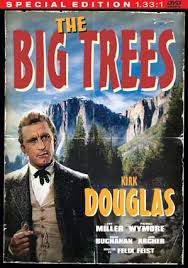
THE BIG TREES
US, 1952, 89 minutes, Colour.
Kirk Douglas, Eve Miller, Patrice Wymore, Edgar Buchanan, John Archer, Alan Hale Jnr.
Directed by Felix Feist.
The Big Trees is a pleasing minor western of the early '50s. It is typical of many Warner Bros. productions at the time. Of interest in later times is the focus on the preservation of forests and wilderness - a theme of conservation to emerge in subsequent decades. The film relies on the charm and strength of Kirk Douglas as its ambiguous hero and there is good support from regular character actors. There is an emphasis on colourful action rather than violence and some colourful spectacle in the forests and the explosions for the destruction of a dam. Unpretentiously entertaining.
1. The popularity of the western? The variations in this western - the community, the Quakers, the trees and the dams, double-dealing? The 1900 setting?
2. Colour photography, special effects, action sequences? The atmospheric score?
3. The film's reliance on familiar conventions of the western? The establishing of hero, girlfriend? The minor characters - goodies and baddies? The Quaker community and the heroine? Conventional use? Differences?
4. The plausibility of the plot? The contrast with the themes of the opening up of the West? The characters of the West and their double-dealings? Changes of heart? Heroism? True love? The treatment and the credibility?
5. Kirk Douglas' strong charm as Jim Fallon? His background as a lumberman? Lack of scruple? His experience in exploiting the redwoods? The background to his finances, wanting to buy land? The commercialising of the trees? The clash with the Quaker community? His reliance on Daisy Fisher and her helping him in financial deals? Her devotion to him? The unscrupulous men backing him? The influence of the Quaker community? The elder? His daughter Alicia and Fallon's change of heart? His decision to sell the claim to the Quakers? The rousing of the Quakers to action? The destruction of the dam and the saving of the trees? The conventional hero - in the Kirk Douglas style?
6. The contrast with the two women: Daisy and the good-hearted entertainer. devoted to Fallon, exploited by him? Brassy style? Selling the claim? The contrast with Alicia and her place in the Quaker community, her father. attraction towards Fallon, suspicions of him? His rescuing her from death? The love and happy ending?
7. The portrait of the Quaker community? The background of their beliefs? Pacifism? Pioneering? The influence of Quakers in the United States? Their veneration for the trees? Their holding them in religious respect? Their attempts to raise money to acquire the land? The clash with Fallon and his buying the dam? Their reaction to the double deals? The blasting of the dam and the saving of the trees?
8. The background of the unscrupulous villains, money deals, attitudes towards the law etc.?
9. Romantic sequences combined with the life of the town, the Quaker community. spectacular clashes, the final action?
10. The contribution of this kind of minor western to the continuing tradition of the Hollywood western, the conventions of the genre? An entertaining contribution?
Published in Movie Reviews
Published in
Movie Reviews
Tagged under